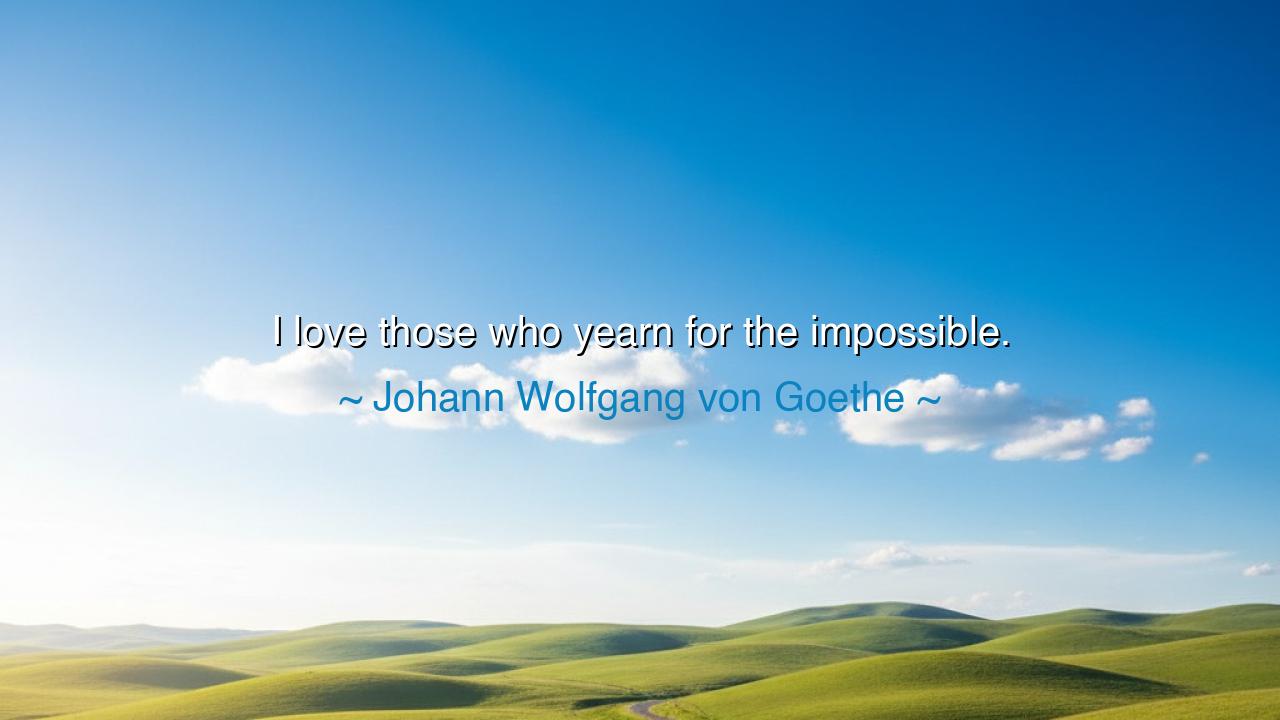
I love those who yearn for the impossible.






In the immortal words of Johann Wolfgang von Goethe, poet, philosopher, and sage of the human spirit, we find one of the most stirring declarations ever made about the soul’s yearning: “I love those who yearn for the impossible.” These words, though brief, are filled with fire — the fire of aspiration, of divine madness, of the human will to reach beyond the boundaries of reason. Goethe’s love, here, is not for the contented or the cautious, but for the dreamers, the seekers, the ones who dare to challenge the limits of existence itself. It is a love for the restless heart, that cannot be satisfied with the merely possible, for such a heart is the engine of creation, of discovery, of all progress in the history of humankind.
The origin of this quote arises from Goethe’s lifelong contemplation of the nature of aspiration. He was a man who lived in the tension between the earthly and the divine, the rational and the romantic. In works such as Faust, he gave voice to the eternal human desire to reach beyond the attainable — the longing to grasp eternity, to know truth, to embrace beauty in its purest form. In his own life, Goethe embodied the principle he expressed: he was not content to be a poet alone but sought mastery in science, art, philosophy, and politics. His spirit refused confinement. To “yearn for the impossible,” in Goethe’s understanding, is to live with intensity — to exist not as a creature of circumstance, but as a creator of possibility.
Those who yearn for the impossible are the ones who propel humanity forward. The philosopher Plato spoke of divine eros — the sacred longing that moves the soul toward the eternal and the true. Such yearning, though never fulfilled, ennobles the seeker. The impossible becomes a mirror in which the soul glimpses its own potential. So too did Leonardo da Vinci spend his life reaching for visions that could not yet be realized: the flying machine, the perfect anatomy, the eternal synthesis of art and science. Though many of his dreams lay beyond his age’s understanding, his striving for them reshaped the world. It is this sacred striving — this refusal to be limited by the visible horizon — that Goethe calls love-worthy. For the yearning itself, not the achievement, is the mark of greatness.
To yearn for the impossible is not to be naive or delusional. It is to hold a vision that transcends the present and compels the soul to rise. When Galileo turned his telescope toward the heavens, he was not merely looking at stars — he was defying the boundaries of belief. When Rosa Parks refused to yield her seat, she was not merely seeking comfort — she was reaching toward a world that did not yet exist. And when Mahatma Gandhi spoke of peace defeating violence, he yearned for what seemed impossible, yet his yearning became the seed of transformation. The impossible, to the brave, is not a wall but a horizon. Every step toward it, however small, reshapes the world.
Goethe’s words also remind us that yearning is not weakness but divine restlessness. Those who seek the impossible are often misunderstood, mocked, or feared, for their vision threatens the complacent and disturbs the order of the mediocre. Yet it is from their ranks that prophets, inventors, and artists arise. The yearning heart, though it may never find full satisfaction, becomes a vessel of light for others. For when a soul reaches for the unreachable, it leaves behind a path for those who follow. This is why Goethe says, “I love those who yearn” — for they are the torchbearers of human evolution, the bridge between what is and what could be.
There is, however, a hidden wisdom in the word yearn. To yearn is not simply to desire — it is to love something distant, something that forever eludes complete possession. It is a kind of sacred sorrow, the ache of the spirit that knows perfection cannot be attained in this world, yet still refuses to cease its striving. This yearning keeps the soul alive. The moment we stop reaching for the impossible, we fall into stagnation; we lose our divine spark. The impossible is not our enemy — it is our teacher, our guide, the ever-receding horizon that keeps us moving forward.
Let this, then, be the lesson drawn from Goethe’s timeless words: do not fear impossibility — embrace it. Let your dreams be vast enough to frighten you. Let your goals extend beyond your reach. For in striving toward the impossible, you become more than you were; your character is tempered, your vision clarified, your soul awakened. Do not seek comfort in certainty; seek meaning in pursuit. Every great creation, every leap of progress, every moment of transcendence was once considered impossible — until someone loved it enough to make it real.
And so, dear listener, take Goethe’s words as a sacred call: yearn mightily. Yearn not for ease, but for greatness; not for safety, but for truth. Whether your impossible is the healing of the world, the mastery of your craft, or the perfection of your own soul, let the fire of that longing guide you. For those who yearn for the impossible do not merely live — they become immortal, their striving echoing through the ages as a hymn to the boundless power of the human spirit.






AAdministratorAdministrator
Welcome, honored guests. Please leave a comment, we will respond soon